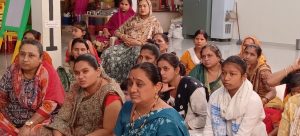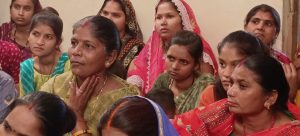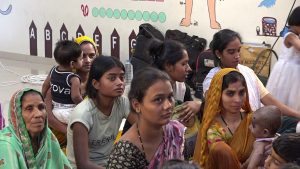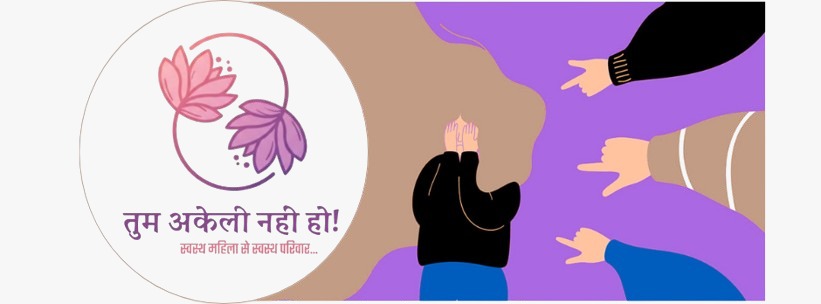The VNM Foundation, established in 2018, works to uplift communities through six key focus areas: Health & Education, Environmental Wellness, Women Empowerment, Sports, Inclusion, and Art & Cultural Enhancement. In partnership with the Vadodara Municipal Corporation (VMC), the Foundation has launched a three-year program titled ‘तुमअकेलीनहींहो!’ to raise awareness about women’s reproductive health at Anganwadis across Vadodara.
Despite available services, many women face barriers like financial constraints, cultural stigma, lack of female healthcare providers, and inadequate culturally sensitive educational materials. These challenges often leave women without proper knowledge and emotional support during important life stages such as postpartum and menopause, leading to avoidable health issues.
The program aims to:
- Raise awareness about reproductive health issues,
- Promote self-care and healthy lifestyle choices,
- Break myths and reduce stigma around childbirth and menopause,
- Encourage timely medical care.
With the permission of Vadodara Municipal Corporation (VMC), ‘तुमअकेलीनहींहो!’ initiative implemented in seven anganwadis of sama Area in vadodaracity during month of march 2025 to address key barriers affecting women’s reproductive health awareness in Vadodara. The program has successfully conducted, reaching women from diverse socio-economic backgrounds and addressed said challenges.
Key Trends Identified:
- Mixed Understanding of Reproductive Health: While many women experience reproductive health issues, their understanding of what constitutes overall reproductive well-being remains limited. There is a strong need for continued and simplified educational interventions.
- Urban Primary Health Centers (UPHCs) Are Key Access Points: Most women rely on UPHCs for healthcare, indicating that these centers are pivotal in addressing women’s health needs. Strengthening their role and visibility can enhance outreach.
- Anganwadi Workers (AWWs) as Vital Connectors: AWWs play a central role in linking women to health services. However, their impact depends greatly on the quality of training and ongoing support they receive.
- Growing Interest in Menopause Awareness:Women have shown notable interest in sessions addressing menopause, a topic often neglected in conventional health education.
- Persistence of Myths and Superstitions:Traditional beliefs and superstitions related to reproductive health continue to influence attitudes. Addressing these sensitively is crucial for meaningful behavior change.
- Program Timing Preferences:Most women prefer attending sessions post-lunch, especially after 1:30 PM. additionally, they are more receptive to weekly sessions rather than continuous multi-day engagements due to household responsibilities.

Key Observations:
- AWC Infrastructure Variations: The quality of Anganwadi Centre (AWC) infrastructure varies significantly across different areas, affecting the consistency and feasibility of program delivery.
- Challenges in Attendance: Securing active participation from women—especially in densely populated slum areas—remains a challenge and calls for enhanced community mobilization strategies.
Need for Inter-Stakeholder Collaboration: Effective and sustainable program implementation demands a collaborative approach involving AWCs, UPHCs, NGOs, and other relevant health and civic stakeholders.

Recommendations:
- Design Focused Educational Modules: Develop and deliver targeted content addressing gaps in knowledge around reproductive health, hygiene, and emotional well-being, especially around menstruation, pregnancy, and menopause.
- Strengthen AWW Capacity: Provide structured training programs and refresher courses for AWWs to enhance their ability to deliver health information confidently and accurately.
- Leverage Community Leaders: Engage local influencers and respected community figures to normalize conversations around reproductive health and encourage participation.
- Improve Attendance through Flexibility & Incentives: Adopt flexible scheduling based on women’s availability. Explore outreach techniques such as mobile sessions, provision of essential items, or linking sessions to services like health checkups to improve attendance.

Critical Insights from the Field: Urgency that Strengthened Our Mission
During the baseline survey for the ‘तुमअकेलीनहींहो!’ program, the VNM Foundation team encountered several deeply concerning situations that highlighted the urgent need for reproductive health awareness and intervention. These real-life cases not only underlined the knowledge gap but also reinforced our decision to implement the program with strong commitment.
In the northern part of Vadodara, we came to know—through an Anganwadi worker—about a minor girl who had been married at a very young age. Though still in her teens, she is already a mother of two and currently pregnant with her third child. Her repeated pregnancies have taken a severe toll on her mental health. This time, her condition has worsened to the point that she has been admitted to a mental health facility. Her case is a tragic reflection of how early marriage, lack of awareness, and limited access to healthcare can deeply impact a young woman’s life.
In another case, a new mother refused to allow any vaccination for her new-born out of intense fear. Despite multiple attempts to educate her about the life-saving importance of immunization, her deep-rooted apprehensions remained unshaken. This revealed the powerful influence of misinformation and the critical need for culturally sensitive counselling.
In the western zone of the city, a 35-year-old woman shared that she had already entered menopause. This early onset, coupled with local myths and confusion about menstruation, was affecting her physical and emotional well-being. Many women believed that menstruation is the body’s way of throwing out “waste,” and once it stops during menopause, it “builds up inside” and causes health problems. Such misconceptions are widespread and harmful.
During the sessions, many more myths came to light. Some women believed that eating bananas during pregnancy is harmful, that the baby can “stick inside the stomach,” or that consuming lemons delays healing after childbirth. Others thought menopause leads to sudden vision loss, and women begin wearing spectacles as a result. These beliefs highlight the lack of accurate health education and the prevalence of age-old superstitions.
We also found that women tend to neglect their own health concerns. For example, one woman diagnosed with tuberculosis (TB) had not visited a doctor. Another woman, who had undergone a family planning surgery, had not had her period in four months yet had not sought medical advice. In a heartbreaking case, a woman left her two children with her mother-in-law and abandoned them, the youngest child, only seven months old, was found tied with threads and thrown into water, thought it saved later on — a distressing result of untreated postpartum mental health struggles.
These real and raw stories emphasize why the ‘तुमअकेलीनहींहो!’ initiative is not just a health education program, but a life-saving, community-transforming movement. The program aims not only to inform but also to empower women with knowledge, compassion, and the support they need to take control of their reproductive health and well-being.
















More Stories
Homai Vyarawalla: भारत की पहली महिला फोटो जर्नलिस्ट की अनोखी कहानी
घरेलू महिलाएं भी कर सकती हैं बचत: जानिए स्मार्ट सेविंग्स के तरीके!
Why Do People Act Strangely After an Accident?